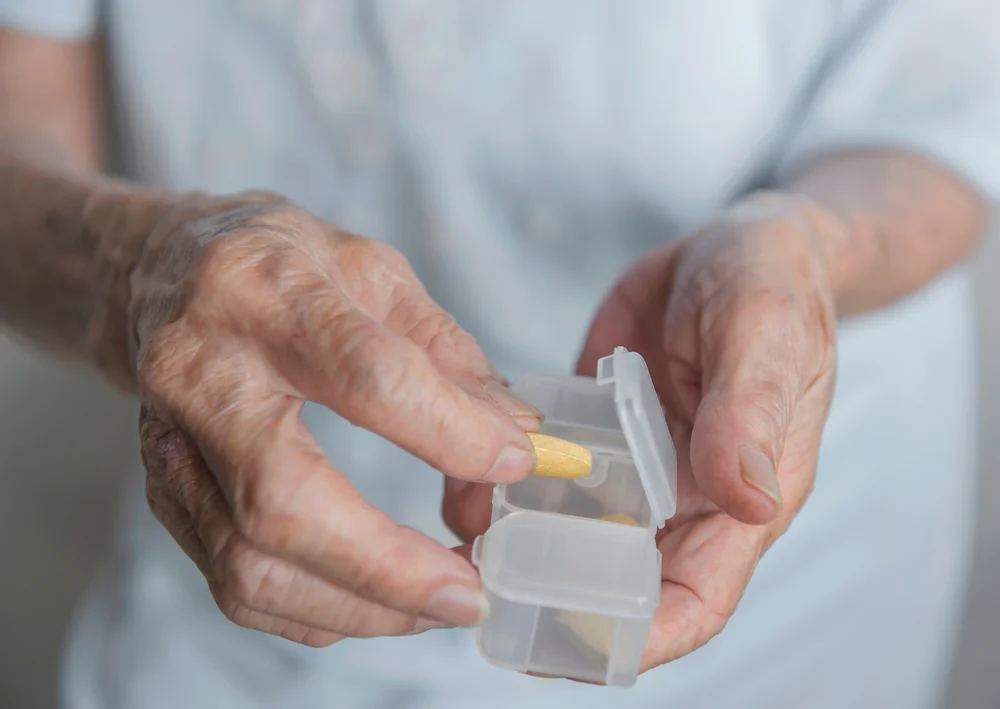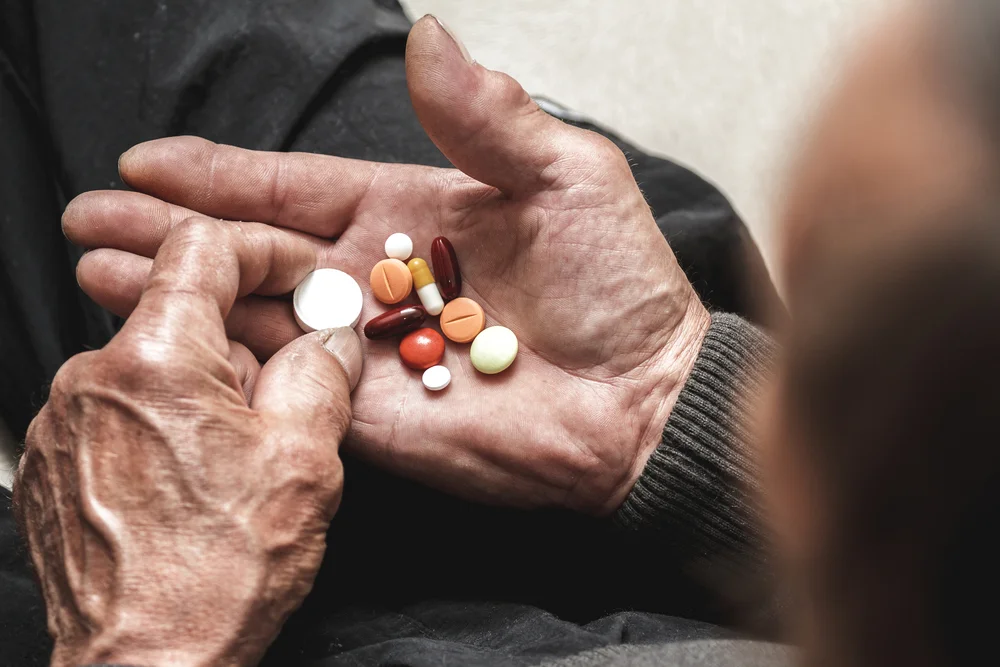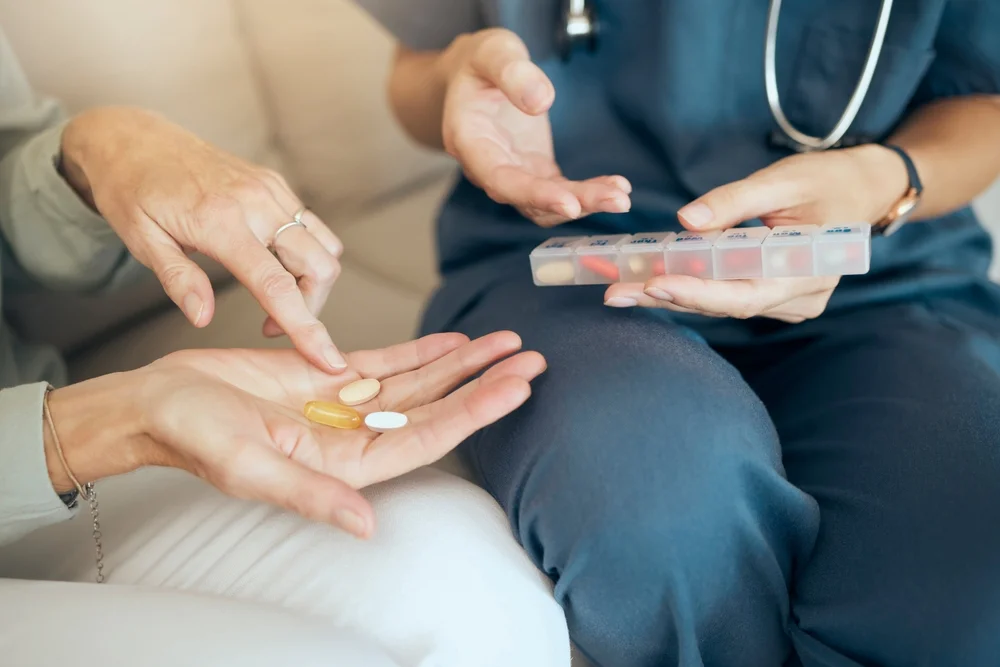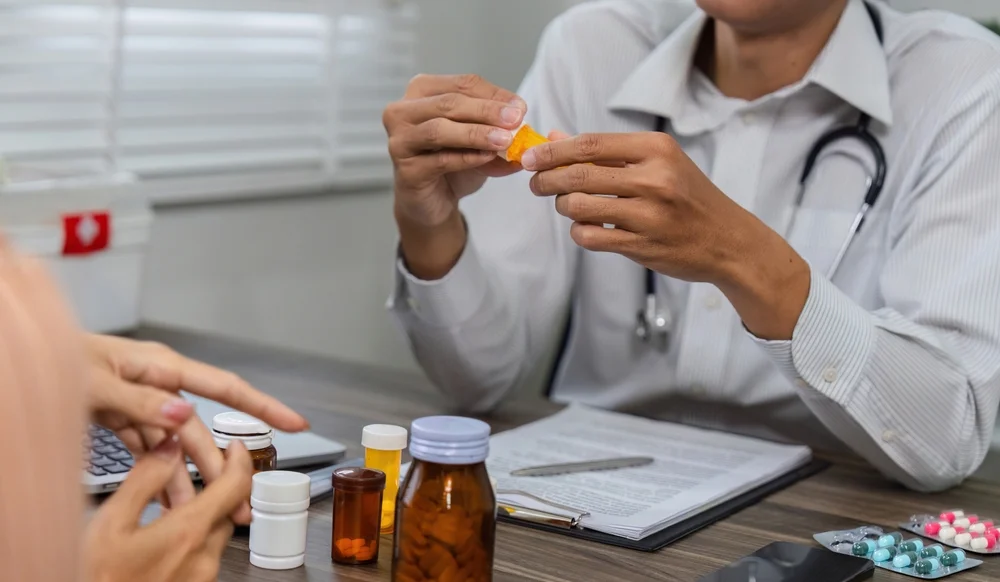Table of Contents
Toggle- What Are Medication Errors?
- Why Do Medication Errors Happen?
- Common Types of Medication Errors
- Who Is Most at Risk?
- How Medication Errors Affect Health
- Where Do Medication Errors Happen Most?
- Can Medication Errors Be Prevented?
- What To Do If a Medication Error Happens
- Tips for Caregivers Managing Medications
- How Healthcare Systems Are Working to Reduce Errors
- FAQs About Medication Errors
- Conclusion
When you go to a doctor, get a prescription, or pick up medication from a pharmacy, you expect everything to go smoothly. You trust that the medicine you’re given is the right one, and that it will help you feel better. However, sometimes things don’t go as planned. A simple mistake in giving or taking medication can cause serious problems. These mistakes are called medication errors, and they happen more often than we think.
This blog will explain everything you need to know about medication errors – what they are, why they happen, how they affect people, and what you can do to avoid them. Whether you’re a patient, a caregiver, or someone who just wants to stay informed, this guide is here to help in the simplest way possible.
What Are Medication Errors?
A medication error is any mistake in the process of prescribing, dispensing, or taking medicine. These errors can happen at any stage – from the moment a doctor writes a prescription, to the moment a patient takes the pill.
Simple definition
A medication error is when the wrong medicine is given or taken in the wrong way, which can cause harm or health issues.
Real-life examples
- A nurse gives a patient the wrong dose of painkillers in a hospital.
- A pharmacist misreads a prescription and gives a different drug.
- A parent gives a child too much cough syrup at home.
These may seem like small mistakes, but in some cases, they can lead to serious side effects, hospital stays, or worse.

Why Do Medication Errors Happen?
Medication errors can happen for many reasons. Sometimes they result from simple human mistakes, and other times from more complex issues in the healthcare system. Let’s look at the most common causes:
1. Human Error
Healthcare workers are highly trained, but they’re still human. Fatigue, stress, or being in a rush can lead to slip-ups. A nurse might accidentally grab the wrong vial, or a doctor might click the wrong option in a digital chart. Even something as small as a distracted moment can cause a big mistake.
2. Communication Problems
Poor communication is a major cause of errors. If a doctor tells a nurse something verbally and the nurse hears it wrong, the patient could get the incorrect dose or drug. Also, if a pharmacist doesn’t understand a doctor’s note or prescription, they might make a wrong assumption.
Sometimes patients don’t understand instructions clearly either. They might think “twice daily” means every 12 hours when the doctor meant morning and evening. These misunderstandings can lead to incorrect usage.
3. Look-Alike and Sound-Alike Medications
Many drugs have names that look or sound very similar. For example:
- Celebrex (used for pain) vs. Celexa (used for depression)
- Hydralazine vs. Hydroxyzine
These names can easily be confused, especially if written quickly or spoken in a noisy environment. Packaging can also be similar, same size bottle, same label colors, which increases the chance of error.
4. Poor Handwriting
Even though electronic prescriptions are more common today, some handwritten prescriptions still exist. If a doctor’s handwriting is unclear, a pharmacist might misread the drug name or dose. For example, a “10 mg” can look like “100 mg” if not written clearly.
5. Incomplete Patient Information
If the doctor or pharmacist doesn’t know the patient’s full medical history, allergies, or current medications, they might prescribe or dispense something unsafe. This is especially risky for patients with chronic conditions or multiple doctors.
6. Mislabeling or Incorrect Packaging
If a pharmacy puts the wrong label on a medication bottle, the patient may take the wrong drug without knowing. Or if a hospital mixes up two syringes, a patient may be injected with the wrong medication.
Common Types of Medication Errors
Not all medication errors are the same. Some are about timing, some about dosage, and others about the type of medicine. Here are the most common kinds of errors you should know about:
1. Wrong Dose
This is one of the most frequent mistakes. It happens when a patient is given too much or too little of a medication. For example, a child might receive an adult dose, or a patient might mistakenly take two pills instead of one.
Wrong doses can cause serious problems—too much of a drug can lead to overdose, while too little might not treat the condition properly.
2. Wrong Medication
Sometimes the patient receives a completely different drug than what was prescribed. This can occur due to:
- Misreading a prescription
- Picking the wrong item from a shelf
- Confusing two similar names
Taking the wrong medicine can have no effect, harmful side effects, or even allergic reactions.
3. Wrong Patient
In hospitals or nursing homes, patients may have similar names or be in nearby rooms. A nurse may accidentally give medication intended for one patient to another. This is why healthcare providers often ask for your name and date of birth—it’s an extra check to avoid mix-ups.
4. Wrong Time or Frequency
Timing matters with many medications. For example, insulin must be taken at the right time relative to meals. If someone takes their medication too late, too early, or skips doses, it might not work as intended or could cause harm.
5. Omission Errors
An omission error is when a needed medication is not given or taken at all. This could be due to:
- Forgetting a dose
- A nurse missing a scheduled time
- A patient stopping medication without telling the doctor
Missing doses of antibiotics or blood pressure meds, for example, can lead to worsening conditions or resistance to treatment.
6. Wrong Route of Administration
Every medicine is made to be taken a certain way, by mouth, injection, eye drops, inhaler, etc. Giving a medication through the wrong route (like injecting something that should be taken orally) can be dangerous or completely ineffective.

Who Is Most at Risk?
While medication errors can happen to anyone, certain groups of people are more vulnerable due to age, health conditions, or the number of medications they take. Here are the people most at risk:
1. Children
Children need much smaller doses of medication than adults. A small error in measurement can make a big difference. Also, many medications aren’t made specifically for children, so doctors often have to calculate custom doses based on weight. This increases the risk of calculation or measurement mistakes.
Parents and caregivers may also struggle with understanding pediatric dosing instructions, especially if the medication uses teaspoons, milliliters, or drops.
2. Older Adults (Seniors)
As people age, their bodies process medication differently. Seniors are also more likely to take multiple medications for various health conditions, which increases the chance of:
- Drug interactions
- Confusion about which medication to take and when
- Difficulty reading small print on labels
- Memory-related mistakes (e.g., forgetting a dose or taking it twice)
3. People with Chronic Illnesses
Patients with long-term health conditions like diabetes, heart disease, or epilepsy usually take multiple daily medications. These regimens can be complex. If anything is missed or done wrong—such as a missed insulin shot or wrong heart pill—it can quickly lead to dangerous complications.
4. Non-English Speakers or Low Health Literacy
People who don’t fully understand medical terms or speak the primary language used in the healthcare system may misinterpret labels and instructions. This barrier can lead to misuse, especially if written or spoken instructions aren’t translated or clearly explained.
5. People Transitioning Between Care Settings
Patients who are being transferred from hospital to rehab, or from one doctor to another, are more likely to experience errors due to miscommunication between healthcare providers or lost information.
How Medication Errors Affect Health
Medication errors can have serious consequences, not just physically, but also emotionally and financially. Here’s how these mistakes can affect someone’s life:
1. Immediate Health Effects
Depending on the medication involved, the error might cause symptoms right away. Some common reactions include:
- Allergic reactions like rash, swelling, or difficulty breathing
- Nausea, vomiting, or dizziness
- Drop or rise in blood pressure
- Confusion or unusual drowsiness
- Seizures or unconsciousness in severe cases
If not treated quickly, these effects can worsen and even become life-threatening.
2. Long-Term Health Issues
Some medication mistakes don’t cause obvious symptoms right away but can still harm the body over time. For example:
- Repeated underdosing might allow a disease to get worse
- Overdosing could lead to liver or kidney damage
- Wrong antibiotics could make infections more resistant
- Delayed treatment might lead to permanent health changes
Chronic problems can develop slowly but cause long-lasting damage if not caught in time.
3. Emotional and Psychological Impact
Beyond physical harm, medication errors can take a toll on a person’s mental and emotional well-being:
- Patients may feel anxious or lose trust in doctors or hospitals
- Families may feel guilty or stressed, especially if they were involved in giving the medicine
- Healthcare professionals who make mistakes may experience burnout, guilt, or fear of losing their license
The emotional fallout can affect how people approach future healthcare decisions.
4. Financial Consequences
Recovering from a medication error can be expensive. Costs may include:
- Additional doctor or emergency room visits
- Hospital stays
- New prescriptions or treatments
- Legal fees if action is taken
- Missed work or caregiving responsibilities
Even one mistake can lead to financial strain for a family.
Where Do Medication Errors Happen Most?
Medication errors can happen anywhere medicine is prescribed, prepared, or taken. While we might think most errors occur only in hospitals, that’s not the case. These mistakes can happen at multiple points across the healthcare system and even in your own home. Below are the most common places where medication errors are likely to occur:
In Hospitals and Clinics
Hospitals are busy places with many moving parts. Doctors, nurses, and pharmacists are all working together to treat multiple patients at once. In such high-pressure environments, miscommunication, fatigue, or distractions can lead to errors. A nurse might administer the wrong medication, or a pharmacist might misread a doctor’s handwritten order.
In Pharmacies
Pharmacists handle hundreds of prescriptions daily. If a prescription is unclear, the pharmacist may guess, or mix up drugs with similar names. Mistakes in packaging or labeling, especially if bottles look alike, can also lead to patients receiving the wrong medication or instructions.
At Home
Once the medication leaves the pharmacy, responsibility often shifts to the patient or caregiver. Many errors occur when individuals:
- Forget to take a dose
- Mix up medications, especially if they take several
- Misunderstand the instructions (e.g., “take once daily” vs. “take once in the morning and once at night”)
- Store medications improperly, affecting their effectiveness
Patients managing chronic conditions on their own are especially at risk. For example, a diabetic patient might accidentally inject the wrong type of insulin due to similar-looking packaging.

Can Medication Errors Be Prevented?
Yes, the good news is that most medication errors are preventable. With some awareness, communication, and simple tools, both healthcare professionals and patients can reduce the risk of mistakes.
What Patients Can Do to Stay Safe
- Ask questions: Never hesitate to ask your doctor or pharmacist what a medication is for, how to take it, and what side effects to watch for.
- Keep a medication list: Write down all the medications you’re taking, including over-the-counter drugs and supplements. Show this list to every new doctor or pharmacist.
- Use a pill organizer: Weekly or daily pillboxes can help keep track of what to take and when, reducing the chance of forgetting or doubling a dose.
- Read labels carefully: Always check that the label matches what your doctor prescribed, and follow the instructions exactly.
- Store medicines safely: Keep medications in their original containers and in a cool, dry place. Avoid places like the bathroom, where humidity can affect drugs.
How Doctors, Nurses, and Pharmacists Can Help
- Use electronic prescriptions: These are often clearer than handwritten notes and reduce the chance of misreading drug names or dosages.
- Double-check before administering: Following the “five rights” of medication safety: right patient, right drug, right dose, right route, and right time.
- Communicate clearly: Using plain language when giving instructions and confirming patient understanding through teach-back methods.
- Create a safe culture: Encouraging staff to report near-misses and actual errors helps improve safety systems and avoid future mistakes.
The Role of Technology
- Barcoding systems: In hospitals, scanning barcodes on the patient’s wristband and medication ensures a match before giving a dose.
- Mobile apps: Many apps are available for tracking doses, setting reminders, and looking up medication information.
- Electronic Health Records (EHRs): These systems help doctors access a patient’s complete medication history and avoid dangerous drug interactions.
What To Do If a Medication Error Happens
Despite everyone’s best efforts, mistakes can still happen. What matters most is how quickly and effectively the situation is handled. Here’s what to do:
1. Stay calm and assess the situation
If you or someone you care for has taken the wrong medicine or dose, try to stay calm. Check for any immediate symptoms like dizziness, rash, trouble breathing, or confusion.
2. Contact a healthcare provider immediately
Call your doctor, pharmacist, or in emergencies, call 911 or go to the nearest hospital. If poison is suspected, you can also contact a poison control center.
3. Do not take any more of the medication
Until you speak with a professional, avoid taking further doses. Keep the medication container handy so you can read the label and explain the situation accurately.
4. Report the error
Even if there are no serious effects, it’s important to report the mistake so that systems can be improved. In the U.S., the FDA’s MedWatch program allows patients and providers to report medication issues.
5. Document everything
Write down what happened, when, who was involved, and what steps were taken. This can help with future medical decisions or in case legal steps are needed.
Tips for Caregivers Managing Medications
If you’re helping someone else – like an aging parent, a child, or someone with a disability – manage their medications, your role is crucial in preventing errors. Here are some easy, practical steps you can take:
- Create a clear medication schedule: Write it out or print it and keep it visible (e.g., on the fridge or in a daily planner).
- Use alarms or reminders: Set phone alerts or use apps that buzz when it’s time for the next dose.
- Keep medications organized: Separate morning and evening doses using pill organizers or labeled trays.
- Attend doctor visits: If possible, go with the person to medical appointments to ask questions and take notes.
- Check for interactions: Make sure the patient’s doctor and pharmacist know about all medicines, including supplements or herbal products.
Being a caregiver is a big responsibility, and your attention to detail can make a major difference in someone’s health and safety.
How Healthcare Systems Are Working to Reduce Errors
Medication safety is a top priority for many hospitals, clinics, and healthcare organizations. Here are some key strategies they use:
Better Training
Doctors, nurses, and pharmacists undergo regular training on updated guidelines, communication techniques, and new medications.
Improved Policies
Many institutions use standardized protocols, such as checklists and “double-check” systems before administering high-risk drugs.
Using Technology
Many hospitals now rely on barcode scanning, automated dispensing machines, and smart infusion pumps to reduce human error.
Encouraging Reporting
Healthcare providers are encouraged to report any near-misses or actual errors without fear of punishment. This helps create a safer environment for everyone.
Audits and Reviews
Regular reviews of procedures, prescriptions, and outcomes allow facilities to identify patterns and prevent future mistakes.
By continuously improving processes and technology, healthcare providers aim to make medication as safe and effective as possible for every patient.
FAQs About Medication Errors
1. Can I sue if a medication error caused serious harm?
Yes. If a medication error results in injury or harm due to negligence by a healthcare provider, you may have the legal right to pursue a malpractice claim. It’s best to consult with a medical malpractice attorney to understand your rights and the steps to take.
2. Are medication errors covered by health insurance?
Treatment for complications caused by medication errors is generally covered by health insurance. However, the original error itself, if it involves negligence, might lead to additional costs or legal processes. It’s important to contact your insurer and discuss any unexpected bills or charges.
3. How can I protect my child from medication errors at school or daycare?
Make sure the staff is fully informed about your child’s medications, doses, allergies, and emergency contacts. Provide written instructions, labeled medications, and a copy of the prescription. Ask who is responsible for giving the medication and how it’s documented.
4. What should I include in a home medication safety checklist?
A good checklist might include:
- An updated list of all medications
- Known allergies
- Storage instructions (such as refrigeration)
- Clear dosage and timing information
- Pill organizer setup
- Emergency contact information
- Refill dates and reminders
5. What is a “near miss” in medication safety?
A “near miss” is a mistake that almost happened but was caught before reaching the patient. For example, a nurse may catch a wrong label before giving a dose. These events are important to report because they help improve safety systems.
6. Can over-the-counter (OTC) medications cause errors too?
Yes. Taking too much acetaminophen (Tylenol) can cause liver damage. OTC drugs can also interact with prescription medications. Always read labels and consult a pharmacist before combining medications.
7. What’s the difference between a side effect and a medication error?
A side effect is an expected reaction listed on a drug label, like drowsiness or nausea. A medication error is a preventable mistake in how the drug is used. If you’re having unexpected or severe symptoms, contact a healthcare provider right away.
8. What are high-alert medications?
High-alert medications are drugs that have a higher risk of causing serious harm if used incorrectly. Examples include insulin, blood thinners like warfarin, and chemotherapy drugs. Hospitals usually have special safety steps in place for these medications.
9. Can herbal or natural remedies lead to medication errors?
Yes. Just because something is natural doesn’t mean it’s always safe. Herbal supplements can interact with prescription medications or interfere with lab tests. Always tell your doctor about any vitamins, teas, or supplements you’re taking.
10. How do I safely dispose of expired or unused medications?
Do not flush them down the toilet unless instructed. Instead:
- Use a local drug take-back program
- Ask your pharmacy if they accept unused medications
- Mix pills with coffee grounds or cat litter, seal in a bag, and throw in the trash if no other option is available
Conclusion
Medication errors are a serious but preventable issue. By understanding how and why these errors happen, we can take simple yet powerful steps to avoid them. Whether you’re a patient, caregiver, or healthcare provider, staying informed and alert can make a real difference.
If you ever feel unsure about medication, ask questions. Keep track of what you or your loved ones are taking. Use tools like reminders, pill organizers, and mobile apps. And most importantly, don’t be afraid to speak up if something doesn’t seem right.
Healthcare is a team effort and when patients, caregivers, and providers work together, the risk of medication errors can be reduced dramatically.






